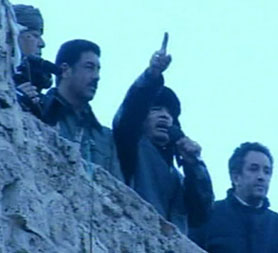Libya: protesters shot in Tripoli, Gaddafi addresses crowd
Colonel Gaddafi urges Tripoli crowd to “get ready to fight for Libya”, as Government forces are reported to have opened fire on protesters. Alex Thomson speaks to a witness to the violence.
At least five people are reported to have died after Government forces began shooting people on a protest march after Friday prayers in Libya.
Shooting was heard in a number of districts in Tripoli, as the uprising against Libyan leader Muammar Gaddafi‘s 40-year rule spread to the capital, which had been strictly under the control of the Government until Friday.
As the city fell into chaos, Gaddafi himself appeared in Green Square in front of thousands of supporters and addressed the crowd, in a show of defiance against the tide of protests against his regime spreading across the country.
“We can crush any enemy. We can crush it with the people’s will,” he declared, waving his fists in the air in a characteristic gesture.
“The people are armed and when necessary, we will open arsenals to arm all the Libyan people and all Libyan tribes.

“Get ready to fight for Libya! Get ready to fight for dignity! Get ready to fight for petroleum!”
“There are corpses everywhere…It’s a war in the true sense of the word.” Eyewitness Akila Jmaa
Channel 4 News Correspondent Jonathan Rugman in Tripoli said the city was a “tale of two cities”.
He said: “It’s a divided city. There’s fighting occuring across Tripoli tonight, but in Green Square, which is the heart of the Gaddafi regime, there are thousands of people waving flags, dancing…in what is very much a show of strength from a leader who earlier this week said he was engaged in a fight to the death.”
The anti-Gaddafi groups have already taken control of large elements of the country, including Benghazi in the east – but until today, demonstrations in Tripoli have not been as widespread. The capital is seen as Gaddafi’s last stronghold after opposition militias also managed to seize western towns near Tripoli on Thursday.
Witnesses fleeing across the border to Tunisia said the opposition had repelled numerous attacks from Government forces trying to reclaim the towns in places like Zawiyah, 30 miles west of Tripoli.
Akila Jmaa said: “There are corpses everywhere…It’s a war in the true sense of the word.”
Army and police in Adjabiya, in the east, said they had gone over to the opposition, and reports suggested that Misrata, the third city, is also under rebel control. Reports remain difficult to verify.
Gaddafi
Despite the ongoing bloodshed, Colonel Gaddafi’s son, Saif al-Islam, said the family had no intention of capitulating.
“We have plans A, B and C,” he told CNN Turk in an interview.
“Plan A is to live and die in Libya. Plan B is to live and die in Libya. Plan C is to live and die in Libya.”
Straight to lead bullets
"This is Libya. We could never be Egypt, never Tunisia. We have no teargas in Libya. No rubber-coated bullets. It is straight to lead in Libya...Life post-Gaddafi will not be easy. But this is our chance. We have to take it. We have to go for it. We will not get it again."
Channel 4 News Chief Correspondent Alex Thomson speaks to a witness who has fled Tripoli for Tunisia.
Read more: Gaddafi and the seven sons, blond mercenaries, and X
Gaddafi called the opposition “terrorists”, and said the Government was in control in the south, west and centre of the country.
The violence is continuing, despite the Libyan Government’s offer of massive cash handouts, including wage increases, food subsidies and allowances, as reported on state television.
It said each family will receive 500 Libyan dinars (£250) to help cover increased food costs, and that wages for some categories of public sector workers would increase by 150 per cent.
‘Day of Rage’
As Libya edged closer into a state of civil war, hundreds of thousands of people across the Middle East took to the streets in protest and celebration at the uprisings in their own nations and in support of Libyans.
Hundreds of thousands were on the streets of Tunis, Tunisia’s capital, where President Ben Ali was deposed last month. People were also protesting in Iraq and Yemen, and Algeria lifted its 19-year state of emergency.
Read more: Arab revolt: Middle East uprisings